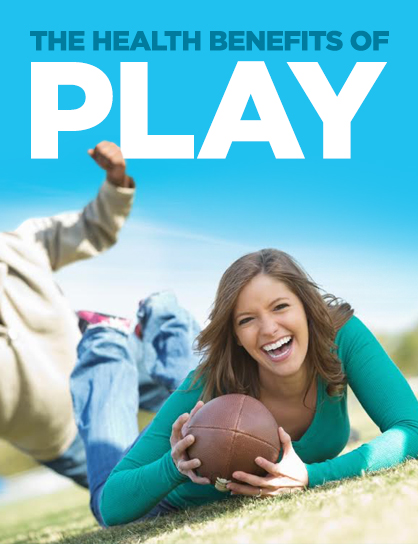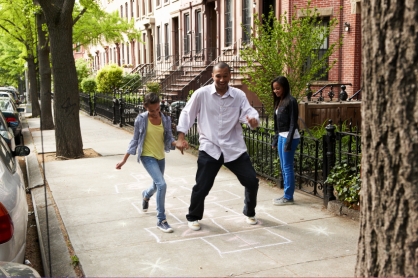Reap the Health Benefits of Play
Play more, stress less
For most adults, the idea of play is a guilty pleasure. Play is considered unproductive, petty and a waste of time. There’s a longstanding perception that once we graduate from college, it’s time to get serious. Other than an occasion golf game, most play is frowned upon for adults.
But experts say that play is just as pivotal for adults as it is for children. It eases stress, anxiety and depression by making people feel happier.
“Incorporating down time and play is important part of productivity. Between work and family obligations we often do not take time for ourselves. It is clear that by taking time each day to take a break and do something just for fun you are reiterated and more motivated to get other things done. If we give ourselves permission to take time for ourselves by scheduling something fun into each day we will ultimately be happier and more productive,” said Cara Maksimow, a licensed therapist.


Why breaks matter
“If you don’t take breaks during the work day, stress can build up and become detrimental to your health and your ability to be your best self as an employee, wife, mother and friend. Stress is the cause for two-thirds of total visits to the doctor. Emotional and physical stress aggravates high blood pressure, insomnia, diabetes, herpes, multiple sclerosis, and other chronic medical conditions. Chronic stress can lead to poor concentration, irritability, anger, and poor judgment which ultimately affect your job performance. Outside of the workplace, stress leads to marriage breakups, family fights, road rage, suicides and violence,” said Dr. Sherry Ross, OB/GYN and Women’s Health Expert at Providence Saint John’s Health Center in Santa Monica, Calif.
Breaks are the equivalent of rebooting our brains. “Researcher K. Anders Ericsson found that the top performers in their field – musicians, athletes, actors, even chess players – worked in bursts. They worked no more than 90 minutes at a time, then gave themselves a rest. Ericsson found this was essential for avoiding exhaustion and to allow their bodies and minds to fully recover from their tasks,” said Paula Felps, Live Happy science editor.
Most psychologists are recommending that people incorporate not only exercise, but enjoyable activities, said Stacy Haynes, psychologist.
“I like to recommend things like coloring, blowing bubbles, even mediation to a fantasy island even for adult clients. I tease that I stay young at heart because I play each day with children as part of my profession. It is important to laugh and to release the stresses of life. Mothers who play with their children enjoy this time just as much as the children. Play can help reduce stress, anxiety , depression and even trauma,” Haynes said.
One of the reasons play has such a positive impact is because it gives us time to recharge and refocus. A person under stress releases fight or flight hormones that make it harder to make good decisions and stay focused. This slows down the ability to be productive, Maksimow said.
“When really stressed at work it can be helpful to not push off fun or break time because it can slow you down and make you more miserable. Take a break and recharge and then go back. If you work somewhere you can get outside and take a walk or perhaps even can throw a ball around. Something simple like having a tennis ball at the office and taking 10 minutes toss around or bounce on wall. You can come back with a refreshed head and recharge the creativity that was most likely dwindling. Keep an eye on the time if that helps. Set a phone alarm for a few minutes so you know when you need to get back to work,” she advised.

Ease stress with play
Use play to allievate stress and take one hour out of your day to find activities you enjoy and find relaxing. Allowing yourself “me time” has to be a top priority during the week, Ross suggested.
And remember, what one person considers fun, might be torture to someone else. So find what you like to do, and dive in.
Felps said, “The activity can be just about anything – it’s the enjoyment you get out of it that’s most important. Some might find a great deal of fun in playing electronic games, while others might prefer a Zumba class or working on puzzles. Whatever ignites your interest and feels like play to you is fine. If you need ideas, hang out with a child – they’ve got this play thing figured out. (If you don’t have your own, borrow a niece, nephew or neighbor kid).”
Maksimow gives her tips on making the most of playtime:
- Plan something fun each week, but also allow time each day. Even 15-20 minutes can provide a break.
- Do what you consider fun. For some, it’s playing a board game with your kids, for others, it’s jogging, meditating, yoga, playing in an adult sport league, swimming or gardening.
- Get together with friends for a movie or a game night.
- Plan each day to read a magazine or take a walk, meditate or play a game.
Tagged in: health, play, stress relief, anxiety, relaxation methods,



